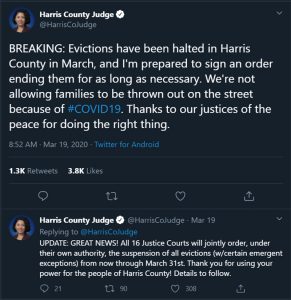EXPLAINER: Examining the effects of COVID-19 on the eviction process
As COVID-19 continues to sweep the world, everyday people are facing financial disaster.
People are being forced to quarantine at home to further prevent the spread of the disease, which is caused by the SARs-CoV-2 virus. Businesses that are considered nonessential have been closed, which has led to a large number of Americans becoming unemployed. Many people struggling to make ends meet may be worried that eviction could be around the corner.
What does eviction mean?
An eviction is when a landlord files a lawsuit to remove tenants and their belongings from the landlord’s property. Landlords can give eviction notices for several different reasons, but not all situations end with being evicted.
The step-by-step process of eviction:
- Step 1- The landlord must hand deliver or send a three day notice to vacate through regular or certified mail.
- Step 2- The landlord must file an eviction petition. This needs to be filed within the precinct and county where the tenant resides.
- Step 3- A precinct constable will serve the tenant. The paperwork from the constable will provide the date and time for the hearing.
- Step 4- The Justice of the Peace (JP) court hearing.
- Step 5- If the tenant wins the case, the eviction process is stopped. If the tenant loses the case, the Judge will give them five days to vacate.

How has COVID-19 affected the eviction process?
As of March 24, the Texas Supreme Court declared an abrupt order to freeze all evictions until April 19. This order was later extended to April 30 as cases of COVID-19 rise throughout Houston. Governor Greg Abbott and Harris County Judge Lina Hidalgo both expressed support for the eviction freeze.
During this time, filings can be submitted, however, there will be no trials, hearings, or eviction proceedings taking place. This is because of the droves of people who are currently facing being laid off, furloughed, or losing other sources of income.
However, there are exceptions to this order. Eviction cases will proceed for cases where tenants who can be described as “an imminent threat” to the landlord, employees of the landlord- or other occupants, as well as tenants who engage in criminal activity.
What are my rights?
The Texas Attorney General’s website states Texas tenants are entitled to the following rights:
- The right to “quiet enjoyment” of your home. This right means your landlord cannot evict you without proper cause or disturb your right to live in peace and quiet. Your landlord must also protect you from any wrongful actions taken by other occupants.
- The right to health and safety in your home. Your landlord is obligated to repair any type of conditions that are having a negative effect on your health/safety.
- The right to security in your home. Your landlord must provide you with basic security measures for your home. Examples of basic security for your home can be described as window latches, deadbolts on exterior doors, locks, latches, security bars on sliding doors, and door viewers.
What are renter’s rights during this pandemic?
If a tenant believes their rights to be violated, a termination of the lease or other remedies may be applied. If the tenant has been unable to resolve a problem, they should consider contacting the Better Business Bureau of Greater Houston and South Texas.
What are some ways of defense for tenants against eviction?
There are several ways a tenant can fight an eviction. Some examples consist of:
- The landlord used a “self-help” procedure. This means that the tenant was forced out of the rental unit by the landlord changing the locks or turning off needed utilities. This procedure is prohibited by Texas state law.
- The landlord did not follow the correct steps when executing the eviction process. This could be essential information not being included, or improper service by the landlord.
- In Texas, landlords have the option to accept late rent or evict. If they accept late rent, the landlord must notify the tenant before giving out a notice to vacate. If the tenant pays the outstanding balance, the landlord may not continue with the eviction process.
Who do you contact when a landlord tries to evict you unlawfully?
Landlords can still file eviction cases with the court, but the process will be halted at that stage. The tenant can legally remain in the home until April 30. If a tenant has been evicted by their landlord during the eviction freeze, the tenant should contact a lawyer when possible.
For assistance, renters can contact the United Way Helpline (211), a free and confidential resource that connects Texans to essential health and human services. For additional resources, Houston residents are able to apply for nonprofit rent assistance programs as well as government programs.

What happens after the Coronavirus pandemic is over and the eviction freeze ends?
Tenants need to be aware that the eviction suspension does not mean rent is not due or that an inability to pay rent on time will not accrue late payments.
The Houston Apartment Association (HHA) has stated that landlords must collect rent regardless of the economic state because of the Coronavirus pandemic. If rent was not collected, apartments and rental homes would not be able to continue functioning.
Late payments for not paying rent on time will differ from property to property. Some property management companies are offering payment plans where tenants pay rent in installments. It is up to the landlord whether to ultimately evict or not. The suspension on evictions means that the court process required to evict is discontinued until the suspension lifts.
The HHA recommends contacting the landlord immediately if a tenant is unable to pay rent.

